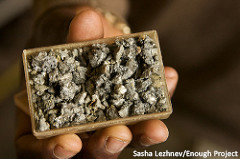
Note: This blog was written by the Enough Project's Annie Callaway and Sasha Lezhnev.
The conflict-free minerals trade has been slowly but steadily increasing in recent years, and 2016 resulted in record-high exports from the eastern Democratic Republic of Congo once again. The North Kivu province, the most 3T minerals-rich province in Congo, reported record-high conflict-free export numbers for both tin and tantalum in 2016. This counters the claims that Dodd-Frank 1502, often referred to as the conflict minerals law, is leading to a de facto embargo on eastern Congo’s minerals.
In 2016, North Kivu exported 1,550.2 tons of tin (worth $11,738,438) and 1,121 tons of tantalum (worth $35,901,748). 2015 was also a record breaking year for tantalum exports, with 947.5 tons recorded, while tin exports were 338.6 tons, according to documents from the North Kivu provincial government.
This increasingly lucrative, more regulated minerals trade stands in stark contrast to several years ago when conflict minerals were a major source of funding for armed groups in Congo’s decades-long conflict and when, according to the U.N. Group of Experts on Congo in 2010, “in the Kivu provinces, almost every mining deposit [was] controlled by a military group.”
President Joseph Kabila’s mining ban in 2010 did lead to a significant loss of livelihoods in eastern Congo. Additionally, implementation of Dodd-Frank 1502 presented challenges initially and companies were slow to source conflict-free minerals from Congo in 2011, but this has turned around significantly in recent years. This is due to several factors, including: better company due diligence systems; the International Conference on the Great Lakes Region (ICGLR) regional minerals certification program and the related mining validation program whereby 204 mines have been assessed and certified as conflict-free; the creation of and increased transparency within the iTSCi “bag and tag” and due diligence system; and the Better Sourcing Program due diligence program.
Thanks in part to systems that have been set up as a result of Dodd-Frank 1502, the minerals trade is slowly beginning to benefit the Congolese people and the government, rather than violent armed groups. However, North Kivu’s provincial government still lacks transparency, as does the Congolese government more broadly, and information about the tax revenues garnered by minerals exports and being put into the provincial Basket Fund must be made more transparent. Additionally, the tracing and certification systems are not perfect and some smuggling still continues, but there have been significant improvements in the transparency and addressing of incidents within the system over the last two years, thanks to the diligent follow up of leading end-user companies such as Apple.
While the new export data is encouraging, challenges still remain in creating a fully conflict-free minerals trade in Congo. In particular, gold continues to fund armed groups and gold smugglers must be sanctioned, and additional livelihood support is needed for Congolese mining communities. In a recent press release, the ICGLR called for continued implementation of Dodd-Frank 1502, combined with enhanced due diligence and traceability mechanisms to build on the progress already achieved.

